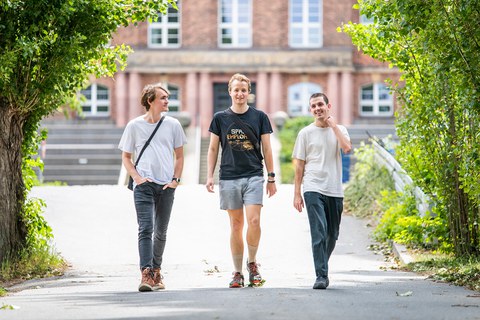Jul 03, 2025
SECAI celebrates its 3rd anniversary
On July 1, the School of Embedded Composite AI (SECAI) celebrated its third anniversary. The agency IMAP visited SECAI at TU Dresden together with external experts to evaluate the effectiveness and sustainability of the program. The successes can be viewed in the annual report(secai.org/jb24) for 2024, which was published at the same time and provides a comprehensive review of the key events and progress in research, teaching and international cooperation in the third year of the Zuse School's existence, which is an excellent educational and research environment in the field of artificial intelligence. It also shows strategic developments, new partnerships and the diverse activities of SECAI members at home and abroad.
A selection of these highlights was presented in a lively and interactive program day as part of the tour. Students, doctoral candidates and professors were actively involved in lectures and discussion panels and presented current developments, research perspectives and highlights as well as opportunities and possibilities for researchers.
Excellence in teaching and science
At the heart of SECAI is the SECAI Graduate School and the scholarship program to train the next generation of AI experts. In 2024, the Graduate School comprised 31 doctoral students and clinician scientists. Carolin Schimmelpfennig and Gregory Veldhuizen were the first two members to successfully complete their training at the Graduate School. Over 80 scholarships were awarded.
In addition to the successful admission of the third cohort of promising students and doctoral students from all over the world, SECAI welcomed three exchange students from South Africa to TU Dresden last year in the summer semester. The stay was made possible as part of an exchange program initiated and funded by SECAI and resulted in research collaborations and joint publications beyond the stay. The cooperation with the University of Cape Town is an example of how the Zuse Schools use their scholarship program and international research networks to promote intensive and sustainable forms of scientific exchange.
In addition, doctoral students and outstanding students from Leipzig University and TU Dresden are supported on research trips and stays at leading international partner institutions. In 2024, numerous SECAI researchers visited international partners, summer schools, symposia and conferences. For example, doctoral student Jonas Karge represented the three DAAD Zuse Schools of Excellence in AI at the conference "Generative AI: Pathways to Democratization, Transparency and Sustainability" in Tokyo. He then took part in the 25th International Conference on Principles and Practice of Multi-Agent Systems (PRIMA-24), where he received the Best Student Paper Award for his work "Taming Dilation in Imprecise Pooling".
The bridge between science and industry
To support Germany's pioneering role in the field of AI, SECAI is creating a platform for intensive exchange between science and industry. SECAI is an active partner in the nationwide Robotics Institute Germany (RIG), which is developing forward-looking answers to challenges such as the shortage of skilled workers, demographic change and climate change. Under the leadership of SECAI Fellows Stefanie Speidel and Frank Fitzek, the focus is on innovative teaching modules, research and start-up programs for students, the establishment of a medical technology cluster and other robotics-based AI initiatives and outreach formats.
In addition, SECAI doctoral students receive support in founding start-ups in programs such as LaunchHub42 in Dresden and SMILE in Leipzig. Through cooperation with these programs and the School's network in the industry, SECAI promotes the transfer of AI innovations into application in a targeted manner and strengthens the regional start-up landscape. Since the School was founded, three promising spin-offs have already emerged from the SECAI environment:
- Soron Systems - autonomous navigation of mobile robots and drones
- StratifAI - multimodal AI models for prognostic support in oncology
- AI-DT - accelerated protein design through AI-supported computational methods
SECAI shapes the scientific and social discourse
With the support of SECAI, Fellow Roberto Calandra initiated the first Touch Sensing and Processing Summer School in September 2024. The event offered 40 participants from 15 countries the opportunity to engage intensively with the still young but rapidly growing research field of AI-supported tactile sensor technology and to exchange ideas with leading experts from research and industry. In December 2024, the Winter School "Artificial Intelligence, Media and Democracy" took place in Leipzig - as an international cooperation between Leipzig University, the University of Padua (Italy) and Sapir Academic College (Israel). SECAI also supports other academic events such as the Cape-KR at the University of Cape Town.
At the two-day Saxon AI Congress, Fellow Stefanie Speidel exchanged views on the future of AI in a panel discussion with Saxony's Minister President Michael Kretschmer. The event brought together key stakeholders from politics, business and science to discuss the concrete implementation and application of artificial intelligence in practice. The focus was also on current research perspectives in AI, the importance of lighthouse projects such as SECAI and the Clusters of Excellence - as well as the role of Dresden as a location for innovation.

